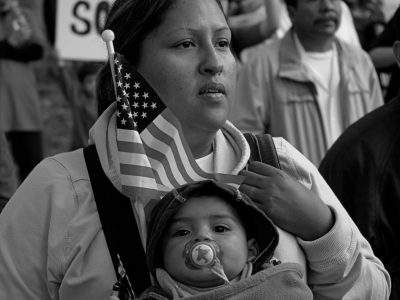Due Process and the Courts
What does the constitution say about due process?
The Fifth Amendment to the Constitution says clearly that no person shall be deprived of life, liberty, or property without the due process of law. Note that this says person, not citizen, and over the years the Supreme Court has consistently ruled that the Due Process Clause applies to all people in the United States.Do non-citizens have the right to due process in the U.S.?
Yes. The Constitution guarantees due process rights to all "persons," not just citizens. This means non-citizens, including undocumented immigrants, are entitled to fair treatment under the law. This includes the right to defend themselves in court. But recent Trump administration policies that speed up deportations and limit access to legal representation make it harder for non-citizens to get their fair day in court.- Access to legal representation Access to legal counsel is an essential part of our justice system and our democracy. In the criminal justice system, anyone facing even one day in jail gets a lawyer if they can't afford one. But immigrants facing deportation usually don't get that chance.The research is clear – the most effective way to ensure some level of due process for people navigating our complicated immigration system is for them to have trained attorney at their side. But Trump administration is now working to strip attorneys from as many people as possible, all in the name of increasing its deportation numbers. This attempt to eliminate basic due process will hurt people who already have few options.
- Fair day in court Due process guarantees that individuals have the opportunity to defend themselves in court. This includes non-citizens facing deportation.
Why is due process important?
We are seeing right now the importance of due process when it comes to President Trump's actions to carry out the so-called Alien Enemies Act, a 1798 wartime law that permits people to be deported outside of the normal framework of immigration law. President Trump has alleged that this law allows him to simply point at any person, declare them to be an alien enemy, and kick them out of the country without ever having a chance to see a judge. Thankfully, the Supreme Court said that is not true, and in a unanimous decision, ruled that people can challenge the Trump administration's invocation of the Alien Enemies Act. That is why due process is so important, because it means that no person can be rounded up and sent to another country without a chance to go to court and make the government prove their case.How is the American Immigration Council working to protect due process?
- We serve thousands of individuals in immigration detention centers through the Immigration Justice Campaign, our initiative with the American Immigration Lawyers Association. The Justice Campaign provides free legal services for immigrants who would otherwise have to navigate our complicated immigration system without a lawyer.
- We use the courts to demand a fair process for immigrants. Our litigation team is fighting back against the Trump administration’s blatant disregard for due process including filing a lawsuit challenging their illegal detention of immigrants in El Salvador’s notorious Terrorism Confinement Center (CECOT).

Labissiere v. Holder – Second Circuit
Noncitizens facing removal must have a meaningful opportunity to present their cases to an immigration judge. On occasion, noncitizens are deprived of this opportunity due to their lawyers’ incompetence or mistake. Although the government has recognized the need for a remedy for ineffective assistance of counsel, see Matter of Lozada, 19 I&N Dec. 637 (BIA 1988), the framework currently used to evaluate whether ineffective assistance has occurred is severely flawed. The Council has long worked to protect the right to effective assistance of counsel for noncitizens in removal proceedings. Read More

Practice Advisory on Supreme Court’s Favorable Decision in Vartelas v. Holder
Washington, D.C.—Last week, the Supreme Court issued a decision in Vartelas v. Holder, holding that the Fleuti doctrine still applies to lawful permanent residents (LPRs) with pre-IIRIRA convictions. This means that LPRs with convictions before April 1, 1997 who travel abroad do not, upon their return, face inadmissibility if their… Read More

Texas and Other 25 States File Misleading Brief at Supreme Court
This week, Texas and the 25 other states challenging the President’s executive actions on immigration filed their brief with the Supreme Court in United States v. Texas. The brief attempts to defend the Fifth Circuit’s decision to block expanded DACA and DAPA from being implemented, but instead makes entirely… Read More

District Court Holds Hearing in Case About Kids’ Right to Attorneys in Immigration Court
A federal district court in Seattle heard arguments in a lawsuit on Thursday seeking to ensure that all children in immigration court have legal representation. The case received a flurry of attention when press reports revealed that an immigration judge deposed in the case said he had successfully… Read More

Judge Who Believes Toddlers Can Represent Themselves, Only Part of the Problem in the Battle over Representation for Kids
Over the past week, several media outlets reported that Assistant Chief Immigration Judge (ACIJ) Jack Weil claimed that he could teach immigration law to three- and four-year-old children such that the children could represent themselves in immigration court. Now, Attorney General Loretta Lynch claims that the… Read More

Hundreds of Groups Weigh in on Immigration Case Headed to Supreme Court
A diverse coalition of 326 immigration, civil rights, labor, and social service groups filed an amicus (friend-of-the-court) brief with the U.S. Supreme Court today in United States v. Texas, urging the court to lift the injunction that has blocked the deferred action initiatives that President Obama announced in November 2014. Read More

Obama Administration Files Brief in Immigration Case at Supreme Court
This week, the Obama Administration filed its brief with the Supreme Court in United States v. Texas, the case where Texas and 25 other states are challenging the President’s executive action on expanded Deferred Action for Childhood Arrivals (DACA) and Deferred Action for Parents of Americans and Lawful Permanent… Read More

D.C. Circuit Hears Case Seeking Records Regarding Immigration Judge Misconduct
Last Tuesday, the District of Columbia Circuit Court of Appeals heard oral arguments in a case filed by the American Immigration Lawyers Association (AILA), which seeks the disclosure of unredacted versions of complaints filed against immigration judges and related documents. To date, the government has refused to turn over the… Read More

What Does Justice Scalia’s Death Mean for United States v. Texas, the DAPA/DACA Case?
Earlier this week, Supreme Court Justice Antonin Scalia passed away at the age of 79. The unexpected death of the then longest serving member on the Court means there is a vacancy on the nine-member bench. But, it is unlikely that the Senate will confirm another Supreme Court… Read More

What’s Next in the Supreme Court Case on Expanded DACA and DAPA?
This week, the Supreme Court announced it would hear arguments in United States v. Texas. The highest court will now determine whether the President’s deferred action initiatives announced in November 2014, known as expanded DACA and DAPA, constitute a lawful exercise of executive discretion. The Supreme Court’s… Read More
Make a contribution
Make a direct impact on the lives of immigrants.
